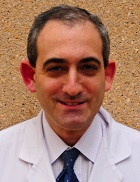It’s a real pleasure for me to introduce Dr. Jason Gotlib as the next Editor-in-Chief of The Hematologist. Many of our regular readers will recognize Jason’s name as he has served stalwartly as a Contributing Editor since 2010. Jason is currently Associate Professor of Medicine in the Division of Hematology at Stanford University School of Medicine. He has a long-standing interest in myeloproliferative neoplasms in general and in mast cell disease in particular.
After graduating from Franklin and Marshall College in Lancaster, Pennsylvania, Jason attended Stanford University Medical School, and like many who have found their way to Palo Alto, he never left. In addition to his outstanding record as a clinical investigator, Jason’s commitment to medical education and training is exemplary. He is Director of the Hematology Fellowship program at Stanford, and since 2005 he has been honored with the Stanford Hematology Division Faculty Teaching Award four times. Jason has served ASH in a number of capacities, including his work with the Committee on Training. Jason is an avid nature photographer, and you can see examples of his work featured in our new sister publication, ASH Clinical News. Jason will be the fifth Editor-in- Chief of The Hematologist, following Andrew Schafer, who was the driving force behind the creation of TheHematologist, Peter Emanuel, Roy Silverstein, and me.
This issue marks my last as Editor-in-Chief of The Hematologist, and, as such, gives me the opportunity to say good-bye to you and to thank the Society for its continued, unwavering support of this member-focused publication. It’s been a pleasure for me to work with members of the Executive Committee, particularly the last three presidents of the Society — Armand Keating, Jan Abkowitz, and Linda Burns. Their President’s Columns have provided readers with candid insight into the priorities and goals of the Society. I would also like to thank the staff behind The Hematologist, who have resolutely championed the publication in its current form as an integral component of the core of the Society, and have given The Hematologist a prominent position on the recently revamped ASH website.
I am particularly grateful to those who have served on the Editorial Board during my tenure. The Diffusion articles are the heart and soul of the publication, and it is the Contributing Editors who scour the literature and identify the best articles for review. They use their clinical/scientific expertise and their communication skills to make these articles understandable and relevant for all of our readers. It is their contributions that make The Hematologist unique. I would also like to thank those who so generously contributed their expertise and time to development of the “Ask The Hematologist” articles, Mini Reviews, and profiles. These articles have lasting value, and archived versions are now much easier to access through The Hematologist section of the ASH website.
“Only kings, presidents, editors, and people with tapeworms have the right to use the editorial ‘we’”
— Mark Twain
Our focus has been on content, and our editorial mantra has been communication, education, and scholarship. We have aimed to effectively communicate to our diverse readership both information from the Society and information about issues that affect our dynamic field. Education has been at the forefront of our editorial vision. We appreciate the pressure on our readers’ time, and accordingly, every article has been developed with the goal of ensuring that the writing was clear, that the content was easily understandable, and that each contribution had the maximum amount of self-contained educational value. Scholarship and educational value are two sides of the same coin. Most of the responsibilities for maintaining the academic integrity of the publication fell on the shoulders of the Contributing Editors and on the shoulders of those who contributed “Ask The Hematologist” articles and Mini Reviews. The emphasis on scholarship reflects our respect both for the readership of The Hematologist and for the authors of the articles that were reviewed.
I find that one of my greatest ongoing challenges is trying (and often failing) to avoid cynicism. The business andpolitics of medicine now seem to dwarf the art and science of medicine, and learning has become regimented and marked by prosaic end-points with names such as MOC and PIM. For me, the best antidote against creeping cynicism is the joy of discovery. Most often now, I am a discovery voyeur, deriving pleasure fromreading about a remarkable solution to a long-standing problem, listening to senior colleagues lecture with restrained pride about their research, or hearing trainees excitedly present the results of their first forays in the lab. When you find yourself bemoaning the time and frustrating effort expendedon fulfilling the latest billing documentation requirement by your electronic medical record, open The Hematologist; it’s largely a record of accomplishment.
Competing Interests
Dr. Parker indicated no conflicts of interest.

